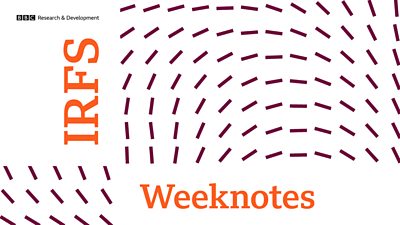
We've paused a couple of projects for various reasons. The synthetic voice project is paused while the survey is out, it will close at the end of the month and then we'll need to analyse the results. The Audio AR projects both paused and are reconsidering their direction. We're also wrapping up our decision-making tools project. But there are new projects starting up and we're adapting to fully remote working.
Newer projects include working on segmented media with ±«Óătv News Labs. We're helping them design a tool that allows journalists to search segments and clips, informed by our work on archive search tools. Mathieu and Andrew have been wireframing and doing interaction design, developing their remote workflow and learning new tools. We're looking forward to their debrief this week.
We're also planning a piece of user research into life under lockdown, collaborating with other ±«Óătv teams. We’re interested in how the pandemic is changing people’s behaviours, particularly the role of media and technology in their lives right now and the role of community and social groups. We'll probably focus on young people and we're proposing to carry out the research with a diary study using a mix of methods, including “data postcards” to track everyday activities and cultural probes, to elicit more in-depth creative responses.
Our speech-to-text project team is working on improvements. From testing new algorithms for voice activity detection, to investigating custom language models for different domains (e.g. sport) to managing the overall vocabulary and how to incorporate new words. Tamsin has been investigating how the words used on the ±«Óătv have changed over time, analysing news articles and TV subtitles - including "screams of despair but also miaaow".
In our recommendation algorithm work we are focusing on cross-media recommendations, e.g. between news articles and TV programmes and radio programmes. We've been creating new datasets for evaluation, exploring new potential data to use and comparing existing recommender algorithms. And in sentiment analysis we're preparing for some user testing, including biometric measurement, so Denise and Joanna are working out the best indicators of stress that can be measured by smart watches.
The synchronised viewing and listening pilot is progressing well. It has a new name and now supports educational and sports content. We're hoping to release this on ±«Óătv Taster soon for you to test. We'll say more about it then.
We've also been reflecting on our remote working. It seems to be working OK for us, though it's difficult to separate it from the effects the lockdown is having on all of us. We've been getting better at it and learning new tools, we've definitely had some really effective collaborative working and workshops. It does seem to have made collaborations with other teams easier, as there's no need to arrange meeting rooms or travel between buildings.
